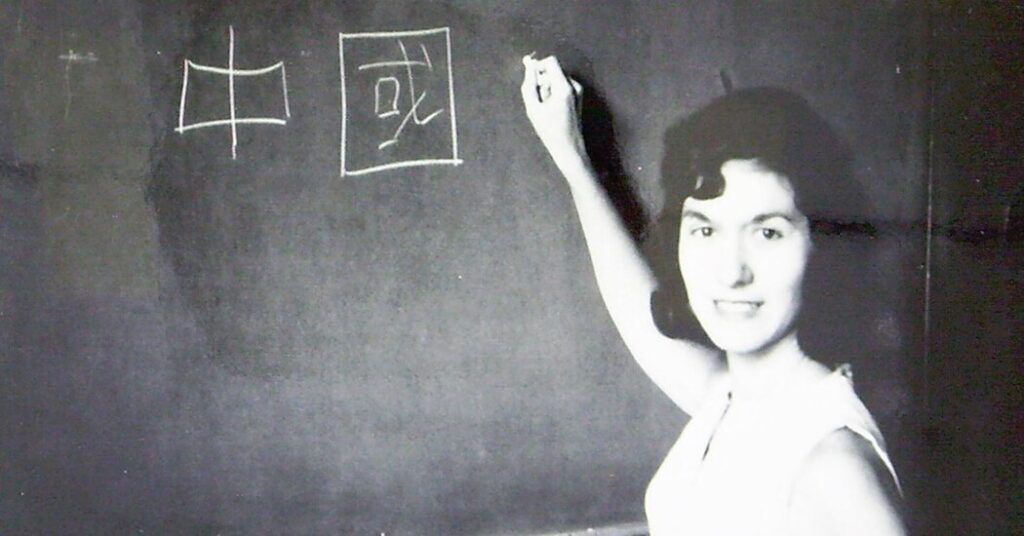In November 1974, a small group of American university presidents toured China for three weeks, visiting universities, communes, factories, and even the office of Vice Prime Minister Deng Xiaoping, who was still four years away from taking over as leader of the Communist Party.
Although the United States had recently reestablished relations with China, it was an insular, even forbidden place, completely foreign to these Western visitors. Fortunately, the delegation had a famous sinologist as a guide: Merle Goldman.
Dr. A historian at Boston University, Goldman was still relatively early in her career but already widely regarded as one of the world’s leading analysts of Chinese politics. She was far from the only prominent Chinese scientist of her generation, but she stood out for her ability to convey her insights to non-academic audiences.
She wrote op-eds and book reviews for The New York Times, The Boston Globe, and The Washington Post, and her accounts of her trips to China were required reading for government and business leaders.
Just weeks after returning from that trip to China, she wrote an in-depth analysis of the country’s defense strategy for The Times.
“Not only does there appear to be a real reservoir of goodwill toward the United States,” she concluded, “but China also wants American support in its hostility toward the Soviet Union.”
Dr. Goldman died on November 16 at her home in Cambridge, Massachusetts. Her son Seth said the cause was Merkel cell carcinoma, a rare form of skin cancer. She was 92.
Dr. Goldman’s specialty was the politics of dissent in modern China, a subject that gave her a unique perspective on the country’s seismic changes under communism.
Her first book, ‘Literary Dissent in Communist China’ (1967), which grew out of her dissertation, was hailed as the first and long the best study of intellectual life in modern China. The praise it received was repeated for her four subsequent books.
“It was like finding the Rosetta Stone for Chinese politics,” wrote journalist John Fraser in a review of her 1981 work, “China’s Intellectuals: Advise and Dissent,” for the Canadian newspaper The Globe and Mail, “and Like hundreds of journalists, students, and sinologists, I feel the kind of debt to Goldman that one always owes for those who offer clarity and genuine insight rather than chaos and confusion.
Dr. Goldman, who also held an appointment at the Fairbank Center for Chinese Studies at Harvard, was one of the first academics to challenge the largely positive image of the Chinese communist government among progressives and other academics in the early 1970s.
She showed that even dissidents who were loyal to the Chinese state and who merely sought to improve it through criticism were often the subject of harsh campaigns of repression. She explained how Mr. Deng, a reformer, cracked down on intellectuals in the 1980s and used them as scapegoats when his efforts to open China’s economy led to rapid inflation.
As her career progressed, she became increasingly vocal in her views on political freedom in China, or the lack thereof. She served on the board of Human Rights Watch and was a member of the US delegation to the United Nations Human Rights Commission. Chinese scholars, writers and dissidents traveling through the United States would be sure to visit her office.
Wang Dan, one of the leaders of the 1989 Tiananmen Square protests, came to see her after she was released from prison in 1998, after reading a smuggled copy of her 1994 book Sowing the Seeds of democracy in China: political reforms in the world’. Deng Xiaoping Decade.”
Congressional committees regularly called her to testify on China-related topics. When President Bill Clinton planned a trip to China in 1998, he turned to Dr. Goldman to help him prepare.
Dr. Goldman was critical of the Chinese state but cautiously optimistic about the country’s potential to open up. Yet she warned in The Times in 1999: “There is no guarantee that China will follow its post-Confucian neighbors on the path to democracy.”
Merle Dorothy Rosenblatt was born on March 12, 1931 in New Haven, Conn. Her parents, Jacques and Rose (Breslau) Rosenblatt, were Jewish immigrants – her father from Romania, her mother from what is now Belarus – who owned a shop that sold furniture fabric.
She studied history at Sarah Lawrence College. While attending summer classes at the University of Wisconsin in 1950, she struck up a conversation with another campus visitor, Marshall Goldman; she was impressed that he was reading Thorsten Veblen’s ‘The Theory of the Leisure Class’.
They married three years later, shortly after she graduated. They both went on to graduate school, he at Harvard, in economics, and she first at Radcliffe College and then at Harvard. She received her doctorate in history in 1964.
They both secured teaching positions in the Boston area: he at Wellesley College, where he specialized in Soviet economics, and she at Boston University, where she taught from 1972 to 2001. She worked at Harvard’s Fairbank Center until 2014.
Marshall Goldman died in 2017. Together with their son Seth, Dr. Goldman is survived by another son, Ethan; two daughters, Avra and Karla; 12 grandchildren; and four great-grandchildren. Her brother, Adolph, died in 2017.
The Goldmans presented themselves as an academic power couple. They hosted monthly dinners at the Fairbank Center, bringing together experts on the Soviet Union and China from across New England. And their extensive knowledge of their respective subject countries – as well as their ability to respond to each other’s insights – made them frequent advisors to politicians and business leaders.
“We don’t argue about the kids,” Dr. said. Goldman in 1988 to The Boston Globe. “We discuss the meaning of Confucius.”
